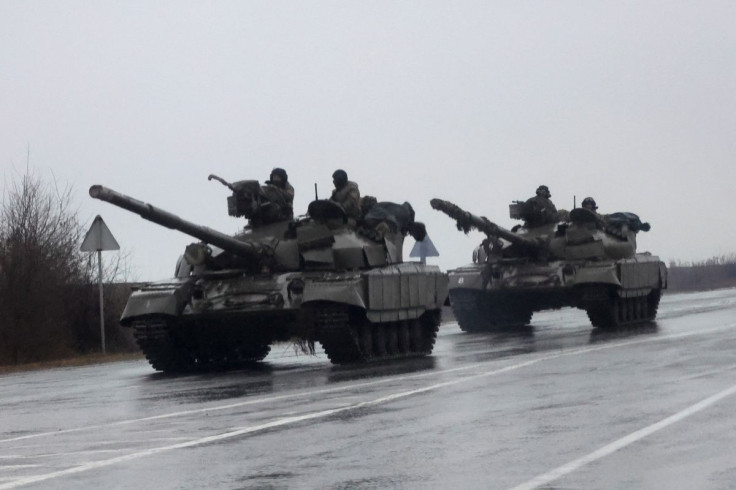Russia-Ukraine War: Where's The Rest Of The World As US And EU Condemn Vladimir Putin?
Despite the condemnations and drumbeat of “severe” sanctions from President Joe Biden and America's European allies following the Russian military moving into Ukraine, it is important to note where the rest of the world is on this.
If there is anything clear so far amid the frenzied diplomacy in the run-up to and surrounding the Russian attack, it is that most of the world has held back from condemning President Vladimir Putin — at least so far, which is hours into the invasion.
Notably, China and India have tread the fine line, avoiding condemning Putin or following the lead of Biden and the West to impose costs on Russia.
China still says the door to a peaceful solution to the Ukraine issue is not fully shut. Its ambassador to the United Nations, Zhang Jun, said, “All parties concerned should exercise restraint and avoid the further escalation of tensions.”
India, which the Biden administration has tried to woo, was equally circumspect. Its UN ambassador, T.S. Tirumurti, said: “We believe the solution lies in sustained diplomatic dialogue between the concerned parties. In the meantime, we strongly emphasize the vital need for all sides to maintain international peace and security by exercising the utmost restraint.”
And India's deputy foreign minister told reporters: "India's stand is neutral & we hope for a peaceful solution."
Delhi | MoS MEA Dr Rajkumar Ranjan Singh, on being asked about the #UkraineRussiaCrisis, said, "India's stand is neutral & we hope for a peaceful solution." pic.twitter.com/NkD8NGq2kh
— ANI (@ANI) February 24, 2022
Two large economies in the world are not condemning Putin or talking of imposing costs on him.
So who has lined up behind President Biden? The European Union, although there are still questions over what kind of sanctions would be acceptable to all members; the UK; Australia; and Japan.
Granted Japan is a big win. And U.S. backstage diplomacy could get some fence-sitters on its side, but notice the big names absent from the above list. Apart from China and India, where are the big African countries, the rising Asian economies, the big countries in South America? Where is Pakistan, or Saudi Arabia?
Yes, some of these countries will air their condemnation of Putin’s Russia when the UN Security Council meets Thursday, but note that there was no swift condemnation, despite that a Russian attack has been building up for weeks now and U.S. diplomats would have worked the phones many times over with several of those world capitals by now. In other words, the global condemnation of Putin that the U.S. and President Biden would have wanted has not materialized.
Part of the reason could be Russia's economic might and its still considerable influence on the world stage. For instance, Russia and India still share a strong strategic relationship, despite U.S. efforts to pry them apart. China has drawn closer to Russia even as friction in its relationship with the U.S. increased.
Part of it could be distrust with that American and western narrative as many feel Putin had raised some genuine concerns about Ukraine aligning with NATO, which essentially is still an anti-Russian alliance, and about the U.S. and NATO treating Russia like a second-rate power that can be intimidated and beaten into submission.
That question was asked by American linguist and philosopher Naom Chomsky: "The question we ought to be asking ourselves is why did NATO even exist after 1990? If NATO was to stop Communism, why is it now expanding to Russia?"
Chomsky is asked about the Russia-Ukraine crisis and points out the obvious which is entirely absent in Western media: "The question we ought to be asking ourselves is why did NATO even exist after 1990? If NATO was to stop Communism, why is it now expanding to Russia?" pic.twitter.com/mkxoYlBeo8
— ☀️👀 (@zei_squirrel) February 23, 2022
The former German navy chief said something about this crisis that the Western narrative has tried hard to bury. Speaking in India last month, he said of Putin: “On eye level, he wants respect. And my God, giving him respect is low cost, even no cost. It is easy to give him the respect he demands, and probably deserves.”
But Vice-admiral Kay-Achim Schönbach lost his job for those comments.

What has so far happened was to paint over those grievances as nothing other than a dictator’s fear of democracy. But it is important to note that not everyone in the world subscribes to the western ideas of democracy, or even to democracy itself.
And not being a democracy is nothing illegal — it may sound regressive in today’s world but it is not illegal. And America itself has a history of supporting many dictators, from the Philippines to Pakistan. Democracy is just one of many ideologies, better in some respects than the others existing in the world, and worse in some respects.
Biden's mistake was to try to intimidate and arm-twist a nuclear superpower in the name of democracy. And it has failed spectacularly — unfortunately with terrible consequences for the Ukrainians.
Robert Gates, the former defense secretary under President Obama, said in his memoir, President Biden -- who wears his foreign policy credentials with pride -- was "wrong on nearly every major foreign policy and national security issue over the past four decades." Here's one more to add to that list.
(The opinions expressed are the author’s own, and not of International Business Times.)
© Copyright IBTimes 2025. All rights reserved.





















